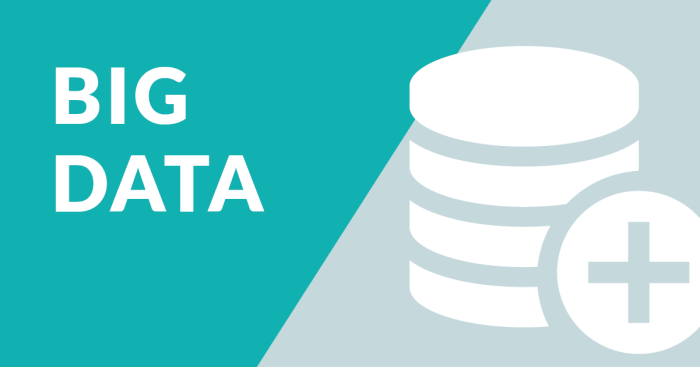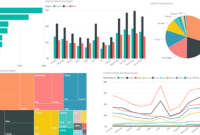Big Data BI sets the stage for this enthralling narrative, offering readers a glimpse into a story that is rich in detail and brimming with originality from the outset. In today’s data-driven world, the convergence of Big Data and Business Intelligence opens up a realm of endless possibilities, transforming the way organizations operate and make decisions.
Overview of Big Data BI
Big Data BI, or Big Data Business Intelligence, refers to the process of analyzing large and complex data sets to uncover insights that can drive strategic business decisions. This involves using advanced analytics techniques to make sense of the vast amount of data generated by organizations.
In modern business operations, Big Data BI plays a crucial role in helping companies gain a competitive edge by identifying trends, patterns, and correlations in data that would otherwise go unnoticed. By leveraging the power of Big Data BI, businesses can make informed decisions, optimize processes, and improve overall performance.
Importance of Big Data BI in Modern Business Operations
Big Data BI is essential in modern business operations as it enables organizations to:
- Gain valuable insights: Big Data BI helps businesses extract valuable insights from large data sets, allowing them to make data-driven decisions.
- Improve decision-making: By analyzing data in real time, organizations can make informed decisions quickly, leading to better outcomes.
- Enhance operational efficiency: Big Data BI can identify inefficiencies in processes and suggest improvements to enhance operational efficiency.
- Personalize customer experiences: By analyzing customer data, businesses can personalize their offerings and improve customer satisfaction.
Examples of Industries that Rely Heavily on Big Data BI
- Finance: The finance industry utilizes Big Data BI to detect fraud, manage risk, and optimize investment strategies.
- Retail: Retail companies use Big Data BI to analyze customer behavior, optimize pricing strategies, and improve inventory management.
- Healthcare: In healthcare, Big Data BI is used to improve patient outcomes, optimize healthcare delivery, and enhance medical research.
- Marketing: Marketing firms leverage Big Data BI to create targeted campaigns, analyze market trends, and measure campaign effectiveness.
Components of Big Data BI

Big Data Business Intelligence (BI) comprises various components that work together to analyze and visualize large amounts of data to derive valuable insights for decision-making.
Data Analytics
Data analytics plays a crucial role in Big Data BI by processing and analyzing vast volumes of data to identify patterns, trends, and correlations. Through advanced analytics techniques such as predictive modeling and machine learning, organizations can extract actionable insights from their data to drive strategic decisions.
Data Visualization
Data visualization is another key component of Big Data BI processes, as it involves presenting complex data in visual formats such as charts, graphs, and dashboards. Visualization helps stakeholders easily interpret and understand data insights, making it simpler to communicate findings and facilitate data-driven decision-making.
Challenges in Implementing Big Data BI

Implementing Big Data Business Intelligence (BI) solutions can pose various challenges for organizations, impacting the effectiveness and success of these projects. One of the key challenges faced in this process is ensuring data quality, which is fundamental for accurate analysis and decision-making within Big Data BI systems. In addition, scalability issues can arise, hindering the ability to efficiently process and manage vast amounts of data.
Data Quality Importance in Big Data BI Systems
Maintaining high data quality is crucial in Big Data BI systems to ensure the accuracy and reliability of the insights derived from the analysis. Poor data quality can lead to incorrect conclusions, impacting strategic decision-making processes within organizations. Organizations need to implement robust data quality management practices to address this challenge effectively.
Scalability Challenges in Big Data BI Projects
Scalability issues often emerge in Big Data BI projects as the volume of data grows exponentially. Organizations may face challenges in processing and analyzing large datasets within reasonable timeframes, affecting the overall performance of the BI systems. Implementing scalable infrastructure and technologies is essential to address these challenges and ensure the smooth operation of Big Data BI projects.
Benefits of Big Data BI

Utilizing Big Data Business Intelligence (BI) offers a multitude of advantages for organizations looking to make data-driven decisions and optimize their operations.
Improved Decision-Making
Big Data BI provides organizations with valuable insights derived from analyzing large volumes of data. By harnessing this information, businesses can make more informed decisions that are backed by data and trends rather than relying on intuition or guesswork.
Enhanced Operational Efficiency
One of the key benefits of Big Data BI is the ability to streamline operations and improve efficiency. By analyzing data in real-time, organizations can identify bottlenecks, optimize processes, and allocate resources more effectively. This leads to cost savings, improved productivity, and overall operational excellence.
Predictive Analytics for Future Trends
Big Data BI enables organizations to leverage predictive analytics to forecast future trends and anticipate market changes. By analyzing historical data and patterns, businesses can make proactive decisions to capitalize on emerging opportunities or mitigate potential risks. For example, retailers can use Big Data BI to predict consumer behavior and adjust their marketing strategies accordingly, leading to increased sales and customer satisfaction.
Tools and Technologies in Big Data BI
Big Data Business Intelligence (BI) relies on a variety of tools and technologies to collect, analyze, and visualize large volumes of data. These tools play a crucial role in helping organizations make data-driven decisions and gain valuable insights from their data.
Popular Tools and Technologies
- Hadoop: An open-source framework for processing and storing large datasets in a distributed computing environment.
- Apache Spark: A fast and general-purpose cluster computing system that provides real-time data processing capabilities.
- Tableau: A data visualization tool that allows users to create interactive and shareable dashboards.
- Microsoft Power BI: A business analytics tool that provides interactive visualizations and business intelligence capabilities.
- Splunk: A platform for searching, monitoring, and analyzing machine-generated big data, such as log data.
Comparison of Software Options
- Cost: Some tools may have higher licensing fees or require additional hardware, impacting the overall cost of implementation.
- Scalability: The ability of the software to handle growing amounts of data and users as the organization expands.
- Integration: Compatibility with existing systems and data sources within the organization.
- Ease of Use: User-friendly interfaces and intuitive features for non-technical users.
- Security: Data protection measures and compliance with industry regulations.
Role of Artificial Intelligence
Artificial Intelligence (AI) plays a significant role in enhancing Big Data BI capabilities by automating data analysis, identifying patterns and trends, and providing predictive insights. AI-powered algorithms can process data at a faster pace and uncover hidden relationships within the data, enabling organizations to make more informed decisions based on real-time information.
As we conclude this exploration of Big Data BI, it becomes evident that harnessing the power of data analytics and visualization can revolutionize business processes, driving growth and innovation. By embracing the challenges and leveraging the benefits of Big Data BI, organizations can stay ahead of the curve in an increasingly competitive landscape.
When it comes to analyzing data and making strategic decisions, businesses rely on BI dashboards to provide real-time insights. These interactive tools allow users to visualize complex information in a user-friendly format, making it easier to identify trends and patterns.
With the rise of data-driven decision-making, Self-service BI empowers users to access and analyze data without the need for IT intervention. This self-reliant approach enables faster decision-making and promotes a culture of data literacy within organizations.
As businesses move towards digital transformation, Cloud BI offers a flexible and scalable solution for storing and analyzing data. By leveraging cloud-based tools, organizations can access insights from anywhere, at any time, leading to more agile and informed decision-making processes.




